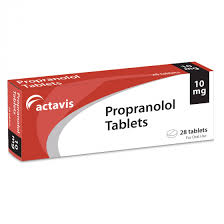What if nurses in A&E wards or staff at rape crisis centres could give rape victims a drug that would make them feel emotionally composed about having been assaulted? Rape kits might even include a small pill that victims could swallow to make them forget the traumatic aspects of their experience.
This is not as far-fetched as it may sound. Propranolol is a beta-blocker drug. If given to a person either prior to or within hours of a traumatic event, it can prevent the development of distressing memories that often lead to Post-Traumatic Stress Disorder (PTSD).
Propranolol works by affecting the way the brain encodes and consolidates memories of events. When a person experiences a severe emotional shock, their body releases large quantities of stress hormones such as adrenaline, which triggers elevated levels of norepinephrine or noradrenaline. This results in what neurologists call an “over-consolidation” of memory, generating symptoms of PTSD such as flashbacks and extreme anxiety. By blocking the release of noradrenaline, Propranolol effectively forestalls the development of these debilitating symptoms. Victims of trauma still recall what happened to them (albeit with some distortion or even amnesia) but they will have effectively forgotten their humiliation, fear, or terror.

In the past decade, neurologists, physicians, trauma specialists, and ethicists have been discussing the potential social (as opposed to medical) uses of the drug to eradicate the emotional pain of traumatic events such as rape and military combat. Indeed, people who have been raped have a high chance of suffering from PTSD. According to one recent study, 39 per cent of American soldiers who experienced combat-related trauma developed symptoms of PTSD compared to 65 per cent of service men who had been sexually assaulted. Who would not want to relieve rape victims of their terror and humiliation?
There are significant risks involved in prescribing propranolol to victims of sexual violence, however. Propranolol could have a detrimental effect for victims seeking to pursue criminal cases against their assailants. The drug greatly increases the probability of complainants giving inconsistent evidence or even suffering amnesia altogether. As psychiatrist Robin Menzies reported in an article published in the Journal of Clinical Psychiatry in 2012, PTSD patients treated with the drug “reported a marked reduction in both the quality and quantity of the integrity of their traumatic memories… resulting in a degree of amnesia for the traumatic event”. A successful court case depends on the accuser remembering the course of events and being able to account for its traumatic aftermath. Administering propranolol to rape victims could dramatically reduce any chance of securing a conviction.
In addition, people prescribed propranolol typically appear detached or calm, a style of comportment that could be interpreted by judges and jurors as incompatible with a serious assault. PTSD patients treated with the drug report “a feeling of emotional detachment, as if it was a normal non-traumatic memory or had happened to someone else”. In the words of one patient,
Before, I couldn’t keep this thing away. Now, I can’t find it…. It’s like you put a bomb under that memory and it’s fragmented…. When I do think of it, it doesn’t upset me. It’s like a sad scene from a movie, not part of my life.
This “flattened affect” means that complainants are less likely to elicit empathy from members of the court.
There might also be unintended consequences for rape victims who refuse to take the drug. As legal scholar Nita A. Farahany explains, in tort law, victims are responsible for lessening any injury to themselves that had been caused by another person. She notes that if a woman had been
stabbed during a robbery instead of raped, we would consider it perverse for her to refuse reasonable medical treatment of her wounds. And in a tort suit against the robber a judge or jury would limit her physical damages because of her failure to mitigate her own injuries. Is her refusal to take propranolol analogous?
In other words, rape victims who refuse to medicate with propranolol could be seen as not taking due precautions: victims are effectively made responsible to mitigate their own trauma.
Perhaps the greatest risks posed by propranolol are not legal but moral. Could a drug that allows victims to “forget” the trauma of sexual violence lessen its perceived wrongness? If a victim is not visibly suffering in the aftermath of an assault, then it is easier for both her and others to minimise the harm done to her. This would reduce incentives to fight for less violent worlds. The “dampening” of the victims’ memory of the emotional effects of trauma might also have the effect of dulling sensitivity to the sufferings of other victims: after all, “it didn’t hurt that much”.
Most importantly, rape culture is adjusted to, rather than opposed. No one benefits from the individualisation of rape as something that is limited to a memory of abuse as opposed to abusive contexts, cultures of masculine sexual entitlement, and the minimisation of sexual harms.
In conclusion, it is also important to note that there is no such thing as a “natural” memory or mental state, and humans are constantly mollifying memories (through alcohol, for example, or distraction techniques). But what is the price of cognitive liberty? Of course, this is not an argument for refusing to mollify suffering. It is one thing for non-traumatised people to make arguments about trauma being character-building; another thing for sufferers whose lives have been destroyed by trauma to agree. The point, though, is that memory is inherently collective: it is constantly being shaped by the social world within which a person interacts.
Bioethics is biopolitics. Pop a pill and forget injustice? It doesn’t seem a good way forward.